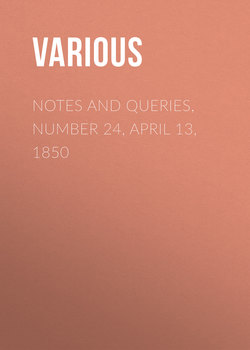Читать книгу Notes and Queries, Number 24, April 13, 1850 - Various - Страница 1
NOTES
SKINNER'S LIFE OF MONK
ОглавлениеReading for a different purpose in the domestic papers of Charles II.'s reign in the State Paper Office, I came upon a letter from Thomas Skinner, dated Colchester, Jan. 30. 1677, of which I will give you what I have preserved in my notes; and that is all that is of any interest.
It is a letter to the Secretary of State, asking for employment, and recommending himself by what he had done for Monk's memory. He had previously written some account of Monk, and he describes an interview with Lord Bath (the Sir John Grenville of the Restoration); in which his Lordship expressed his approval of the book.
"He [Lord Bath] professed himself so well satisfied, that he was pleased to tell me there were two persons, viz. the King and the Duke of Albemarle, that would find some reason to reflect upon me."
Lord Bath gives Skinner a letter to the Duke of Albemarle (Monk's son), who receives him very kindly, and gives him a handsome present.
"I have since waited on his Grace again, and then he proposed to me (whether upon his own inclination or the suggestion of some about him) to use my poor talent in writing his father's life apart in the universal language; to which end, he would furnish me with all his papers that belonged to his late father and his secretaries. The like favour it pleased my Lord of Bath to offer me from his own papers, some whereof I had a sight of in his study."
Now if any of your readers who are interested in Monk's biography, will refer to the author's and editor's prefaces of Skinner's Life of Monk, edited in 1723, by the Rev. William Webster; and to Lord Wharncliffe's introduction to his Translation of M. Guizot's Essay on Monk, they will see the use of this letter of Skinner's.
1. The life is ascribed to Skinner only on circumstantial evidence, which is certainly strong, but to which this letter of Skinner's is a very important edition. This letter is indeed direct proof, and the first we have, of Skinner's having been employed on a life of Monk, in which he had access to his son's and his relative Lord Bath's papers; and there can be no serious doubt that the life edited by Mr. Webster was a result of his labours.
2. This letter would show that Skinner was not on intimate terms with Monk, nor so closely connected with him as would be implied in Mr. Webster's and Morant's, the historian of Colchester, description of him, that he was a physician to Monk. Else he would not have required Lord Bath's letter of introduction to the son. Lord Wharncliffe has, I have no doubt, hit the mark, when he says that Skinner was probably Monk's Colchester apothecary. Skinner says himself, in his preface, that "he had the honour to know Monk only in the last years of his life."
3. The previous account of Monk, which gained Lord Bath's approval, and led to Monk's son soliciting him to write a life, is probably Skinner's addition of a third part to Bate's Elenchus Motuum, to which he also probably refers in the opening of his Preface to the Life of Monk:—
"I have heretofore published something of a like nature with the following sheets, though in another language, wherein several things, through want of better information, were imperfectly described."
4. It appears from Skinner's letter, that his original intention was to write a Life in Latin. Webster edited the Life which we have, from a copy in English found in the study of Mr. Owen, late curate at Bocking in Essex, and supposed to be in Skinner's handwriting; and he had seen another copy, agreeing literally with the former, which had been transcribed by Shelton, formerly rector of St. James's in Colchester; and which, after Mr. Shelton's death, became the property of Mr. Great, an apothecary in Colchester. (Webster published in 1723.)
Now, Query, as these may have been copies of a translation, can any Colchester reader help to settle affirmatively or negatively the question of a Latin Life of Monk by Skinner?
I add two other Queries:—
It appears from a passage in the Life (p. 333.), that Skinner appended, or intended to append, a collection of papers:—
"As appears from His Majesty's royal grant or warrant to him (Sir John Grenville), which we have transcribed from the original, and have added in the collection at the end of this history."
Webster says he never could get any account of this collection of papers. Can Colchester now produce any information about them?
Can any of your readers give any information about those papers of the second Duke of Albemarle, and of Grenville, Earl of Bath, to which Skinner had access? Lord Bath's papers were probably afterwards in the hands of his nephew Lord Lansdowne, who vindicated Monk in answer to Burnet.
W.D. CHRISTIE.
